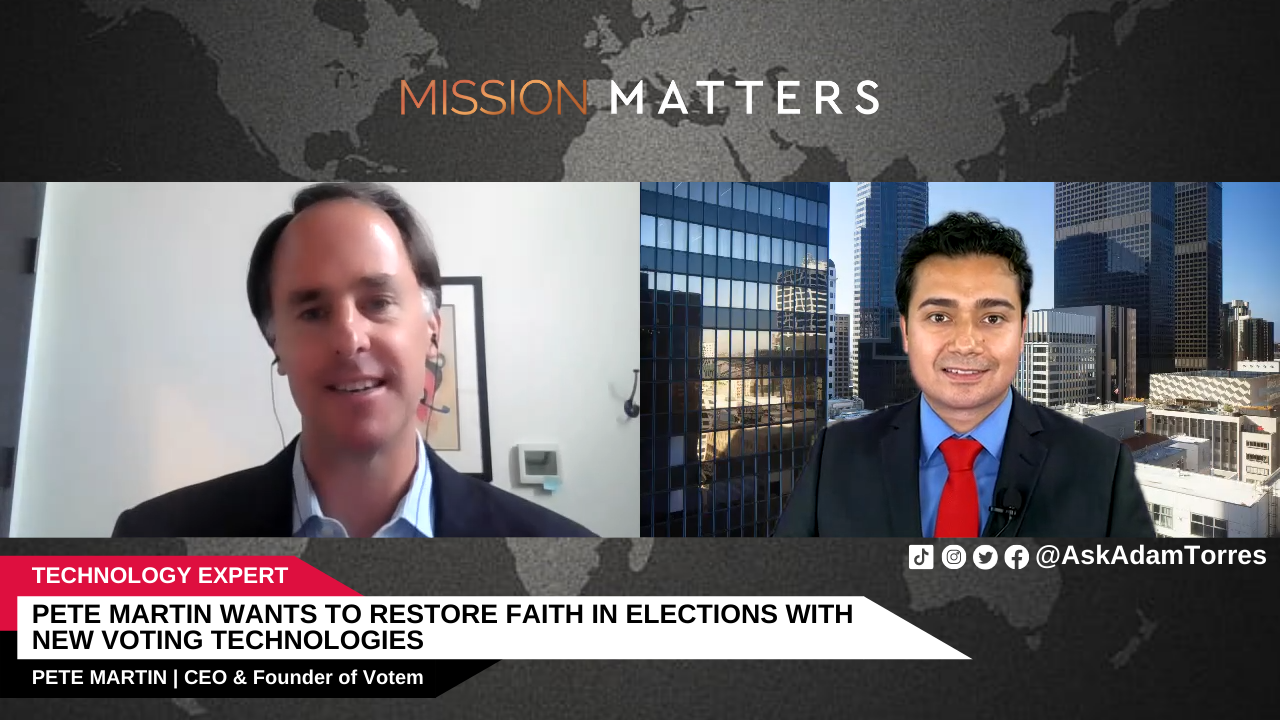
Pete Martin Wants to Restore Faith in Elections with New Voting Technologies
Pete Martin, the CEO and founder of Votem, was interviewed on Mission Matters Business Podcast by Adam Torres.
Pete Martin has more than 20 years of experience in enterprise technology and software. In addition to launching and running Votem, he is the author of Sparking a Mobile Revolution: How Mobile Voting Will Change the World as We Know It.
Listen to the complete interview of Pete Martin with Adam Torres on Mission Matters Business Podcast.
What mission matters to you?
Martin says he wants to support democracy in the US and restore global trust in elections. By giving citizens verifiable proof that their vote is being counted exactly as they cast it on the ballot, he says, Votem could bolster citizens’ faith in the voting process.
How did you get started?
Entrepreneurship runs in the family, Martin says, noting that Votem is his fifth company. He says he’s been interested in politics since childhood, and when he sold his most recent business five years ago, it was with the intention of getting into politics himself. But after meeting Peter Diamandis, the CEO and founder of X Prize Foundation, at a conference, he decided to build and launch a mobile voting app instead, potentially impacting billions of people around the world.
What’s wrong with the current voting platform, and how can online voting help?
As has been widely reported, after the now-former US President, Donald Trump, lost the election in 2020, he claimed the election results were fraudulent, sparking a wave of similar sentiments from his most fervent supporters. Martin says a portion of the electorate’s trust in electronic voting has been compromised in recent years, resulting in a movement back toward the paper ballots of yesteryear.
A level of distrust in software-based voting systems has taken hold, Martin explains, but he stresses that the process of electronic voting serves a far greater portion of the voting public, many of whom may find it difficult to vote in person and/or via paper ballot due to a variety of constraints. Even though the world is digitizing itself by leaps and bounds, he says—which can be a good thing—voting is moving backwards.
Martin cites Brazil and Estonia as examples of countries that have been using electronic voting for more than a decade, and globally, he says, many people want to use online voting with the caveat that it must be secure and trustworthy.
Even if a government moves to paper ballots, he says, there’s no guarantee that the counting will be done properly. But in Votem’s CastIron online voting platform, he says, every stakeholder is online, including citizens, observers, the media, election parties, and candidates, all of whom can monitor and in some cases validate every vote in real-time, reducing or even eliminating the chances of fraudulent activity.
How does Votem work?
Votem is a five-year-old company that uses blockchain technology. To date, Martin says, the platform has tallied 13 million votes for private elections. In 2020, the company provided support for several U.S. states whose military and overseas voters could not otherwise vote electronically. Votem provides end-to-end encryption for each ballot, which election officials then decrypt to process each vote.
What is the voting process in Votem?
The voter feeds their details (name, address, SSN, date of birth) into a verification page and generally a second step using a randomly generated PIN code. In some jurisdictions, the voter may be required to authenticate their identity using another form of identity such as a photo ID, thumbprint, or face recognition.
Once the voter has been verified as an eligible voter, they receive the applicable ballot based on their location such as precinct.
The voter marks the ballot, and the system eradicates all personal details during the submission process so the voter cannot be identified afterward.
Upon submission, the voter receives a confirmation that the vote has been successfully submitted.
The platform, called CastIron, handles the confirmed receipt of the ballot, the electronic shuffling to ensure anonymity and the tabulation (counting) of the results.
What are the benefits of Votem?
In a traditional paper ballot system, Martin explains, votes may be rejected due to minor anomalies such as marking an X over a bubble instead of filling it in completely, a signature that doesn’t match, over-voting (marking more than the allowed choices) or under-voting (not making a mandatory selection) —or, as in the case of the US Presidential Election of 2000, because of hanging chads. People may not read the instructions carefully enough, and their vote may go to waste. Electronically, however, Martin says such blunders are eliminated. Votem, he says, controls human error and justifies every vote.
What’s next for Votem?
Martin says Votem is focusing on four challenges: technological - proving to security researchers, academics and public officials that the server is safe and unhackable; social - making people aware of its existence and building trust; growth, gaining more traction and doing more piloting of the software to build more examples of success; and the political nature of introducing new voting technologies.
In an effort to accelerate adoption of online voting, the company will be introducing “Vote ‘n Go” which is a patented technology to allow voters to mark their ballots on their mobile device and then print a tabulatable ballot on demand. Similar to “Fast Pass,” this could eliminate lines at the polls and give voters more privacy, accessibility and verifiability at the polls.
To learn more about Votem, visit www.votem.com.
Media Communications
Inquiries: [email protected]
Publicist for Adam Torres and Mission Matters Media KISS PR Brand Story PressWire
Brand Publicity Partners KissPR.com
For more details, visit Kisspr.com.
KISS PR Digital PR & Marketing powers the Mission Matters Business podcast with brand storytelling. T: 972.437.8942
